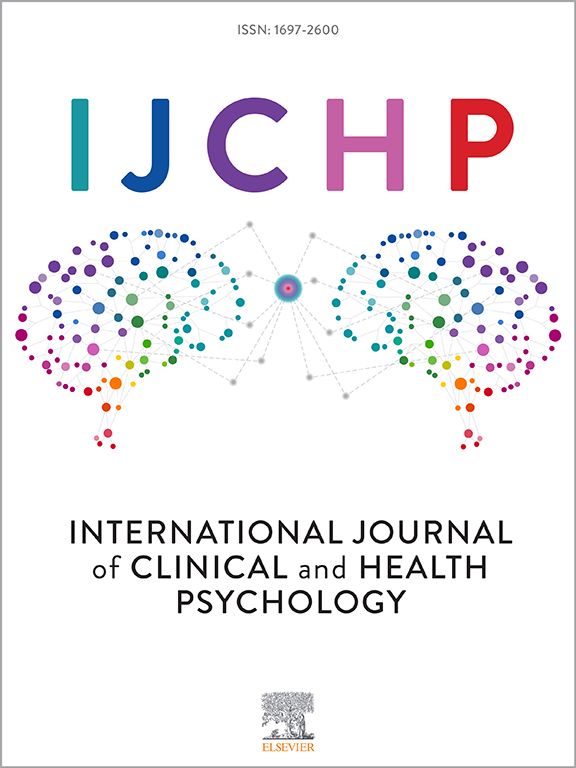Examining the reliability and sources of validity evidence of the sexual cognitions checklist
IF 4.4
1区 心理学
Q1 PSYCHOLOGY, CLINICAL
International Journal of Clinical and Health Psychology
Pub Date : 2025-07-01
DOI:10.1016/j.ijchp.2025.100605
引用次数: 0
Abstract
Background/objective
The Sexual Cognitions Checklist (SCC) is the only measure that distinguishes and assesses both positive (PSC) and negative sexual cognitions (NSC). This study aimed to deepen the psychometric properties of its Spanish version by testing invariance, reliability, differences in frequency, associations with sexual functioning in solitary masturbation and sexual relationships and presenting standard scores.
Method
A total of 2004 Spanish cisgender heterosexual adults (48.1% men, 51.9% women) aged 18 to 79 years (M = 38.23; SD = 13.70), distributed across age groups (18–34, 35–49 and 50 or older) participated. Analyses included measurement invariance, McDonald’s omega, MANCOVAs, correlations, partial correlations, and regression models. Norms for positive sexual cognitions were generated by gender and age.
Results
Strict invariance was confirmed across educational level, relationship status, and relationship length, and partial strict invariance for gender on both the SCC-PSC and SCC-NSC scales. Age showed strict invariance in the SCC-PSC scale and configural in the SCC-NSC scale. The subscales showed good internal consistency. Frequency differences emerged, notably by gender, with men scoring higher in positive and women in negative sexual cognitions. Positive sexual cognitions were positively associated with sexual functioning, negative ones showed negative and weaker associations.
Conclusions
The Spanish SCC version demonstrates reliability of its scores and provides sources of validity evidence for the interpretation of its scores, including associations with sexual functioning and measurement invariance across groups, enabling group comparisons. The availability of norms for positive sexual cognitions further supports its application in clinical settings. Future studies should include diverse populations and individuals with diagnosed sexual dysfunctions.
检验性认知量表的信度和效度证据来源
背景/目的性认知检查表(SCC)是区分和评估阳性(PSC)和阴性(NSC)性认知的唯一方法。本研究旨在通过测试其西班牙语版本的不变性、可靠性、频率差异、与单独手淫和性关系中性功能的关联,并提出标准分数来加深其心理测量学特性。方法2004例18 ~ 79岁的西班牙异性恋成年人(男性48.1%,女性51.9%)(M = 38.23;SD = 13.70),分布在18-34岁、35-49岁和50岁及以上的年龄组。分析包括测量不变性、麦当劳ω、mancova、相关性、部分相关性和回归模型。积极性认知的规范是由性别和年龄产生的。结果SCC-PSC和SCC-NSC量表在教育程度、关系状态和关系长度上均存在严格不变性,在性别上存在部分严格不变性。年龄在SCC-PSC量表中表现出严格的不变性,在SCC-NSC量表中表现出构型。各分量表具有良好的内部一致性。频率差异出现了,尤其是性别差异,男性在积极性认知方面得分更高,而女性在消极性认知方面得分更高。积极的性认知与性功能呈正相关,消极的性认知与性功能呈负相关且相关性较弱。结论西班牙语SCC版本证明了其分数的可靠性,并为其分数的解释提供了效度证据来源,包括与性功能和跨组测量不变性的关联,从而实现了组间比较。积极性认知规范的可用性进一步支持其在临床环境中的应用。未来的研究应该包括不同的人群和诊断为性功能障碍的个体。
本文章由计算机程序翻译,如有差异,请以英文原文为准。
求助全文
约1分钟内获得全文
求助全文
来源期刊

International Journal of Clinical and Health Psychology
PSYCHOLOGY, CLINICAL-
CiteScore
10.70
自引率
5.70%
发文量
38
审稿时长
33 days
期刊介绍:
The International Journal of Clinical and Health Psychology is dedicated to publishing manuscripts with a strong emphasis on both basic and applied research, encompassing experimental, clinical, and theoretical contributions that advance the fields of Clinical and Health Psychology. With a focus on four core domains—clinical psychology and psychotherapy, psychopathology, health psychology, and clinical neurosciences—the IJCHP seeks to provide a comprehensive platform for scholarly discourse and innovation. The journal accepts Original Articles (empirical studies) and Review Articles. Manuscripts submitted to IJCHP should be original and not previously published or under consideration elsewhere. All signing authors must unanimously agree on the submitted version of the manuscript. By submitting their work, authors agree to transfer their copyrights to the Journal for the duration of the editorial process.
 求助内容:
求助内容: 应助结果提醒方式:
应助结果提醒方式:


